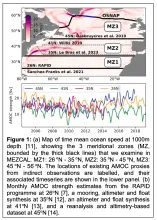The aim of MEZCAL (Methods for Extending the horiZontal Coverage of the Amoc Latitudinally and retrospectively) is to address the challenges of the Atlantic Meridional Overturning Circulation (AMOC) current observing system and make a step change in our understanding of the AMOC’s spatial structure across the North Atlantic, as well as its long-term temporal evolution.
MEZCAL will deliver the following objectives:
- Design and implement a spatiotemporally complete AMOC framework from indirect observations using proven reconstruction techniques.
- Extend AMOC records backwards in time using machine learning and adjoint modelling methods.
- Make recommendations for an AMOC monitoring framework and enhanced observations to ensure a sustainable future AMOC monitoring system.
NOC people
MEZCAL


